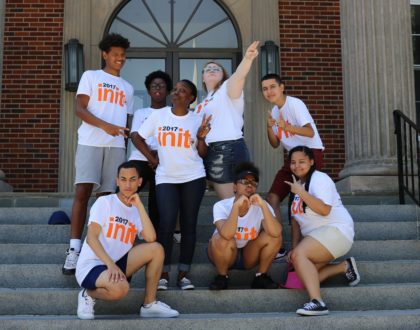Last summer, the 19-year-old University of Massachusetts Boston sophomore was stopped near his home by a Boston police officer investigating a fire of suspicious origin in Dorchester. McLean-Nichols says the officer grilled him for information and threatened to take him to a police station. He walked away from the encounter feeling like he had done something wrong, even though he knew he hadn’t.
McLean-Nichols, who is black and has shoulder-length dreadlocks, says he has to walk through high-crime neighborhoods to get to his home and he frequently wears hoodies.
“I’m thinking, ‘What did I do?’ Even though I’m innocent I still feel like I did something wrong,” he said. “I was demonizing myself.”
With the election of Donald Trump on Tuesday, McLean-Nichols and other Boston teens said they now fear they could be unfairly targeted by police more often. That fear is based on Trump’s praise for New York City’s controversial “stop-and-frisk” policy, which was ruled unconstitutional in 2013 because it disproportionately targeted people of color. Nonetheless, during his campaign, Trump said the practice should be adopted nationally.
“That could get in the way of our everyday lives, our safety,” said McLean-Nichols during an interview at Teen Empowerment, a program that trains young people as community organizers. “Even if it’s not happening to each individual, we understand it could happen to us.”
In Boston, the police department has been praised for building community relationships, and, despite Trump’s rhetoric, officials here said they have no plans to do anything differently.
“We have been successful because of our efforts in community engagement such as connecting with youths through dialogue, basketball games, peace walks, and ice cream,” Boston police spokesman Lieutenant Detective Michael McCarthy said in a prepared statement. “Looking ahead, we will continue to build on these successful strategies to keep Boston safe.”
Boston has been spared the unrest that has occurred in other cities after shootings of unarmed black men by police, but the shootings sparked a national dialogue on use of force by police and racial profiling. Josue Rosado, a 15-year-old from Roxbury, said he worries that Trump’s election means that conversation is now effectively over.
“It’s bad enough as it is,” said the Charlestown High School student during an interview at the Dorchester Youth Collaborative, a center for low-income and at-risk youth. “We have so many reports of police treating people unfairly.”
Rosado described his own interactions with police as largely negative.
“They assume I’m something I’m not,” said Rosado, who is Puerto Rican. “Our communities will go from bad to worse. Police brutality will get worse for blacks and Latinos.”
It’s a worry that many have expressed in the days following the election.
“He is making a lot of people fear for their lives,” Elexxus Ryan, 16, a student at John D. O’Bryant School of Mathematics and Science, said of Trump. “Bringing back stop-and-frisk at a time when police brutality is so heated, is like we’re working backwards. It’s giving police more power when we’re trying to even out that power, and so he’s like enabling them, sanctioning police brutality and making it seem as though it is OK.”
Friend and classmate Jamaleek Bush, 16, added, “We’re afraid. My nephew is a black man, my cousins are black men, my father is a black man. We always feel uneasy around the police.”
Rahsaan Hall, director of the Racial Justice Program at the ACLU in Massachusetts, said a national stop and frisk policy could be challenged at the state level if a local police department used it in a way that violates a person’s constitutional rights.
“It doesn’t yield good results,” Hall said of the policy. “Police rarely ever recover that much contraband. It doesn’t make that much policing sense. It could lend itself to a very volatile situation”
In 2013, a federal judge ruled that New York City’s stop-and-frisk was unconstitutional because it amounted to a “policy of indirect racial profiling.” But stopping and searching people is not unconstitutional so long as an officer has a reasonable basis for the stop or believes the person may be armed, said Hall.
Boston police conduct what they call Field Interrogation and Observations, which include stops and searches. Studies by the ACLU and the police department found that Boston police disproportionately observed, interrogated, or searched black residents from 2007 through 2010. Police officials said then that officers were not motivated by racial bias, but were deployed in high-crime areas where many minorities live. Officials said officers were focused on known offenders.
McCarthy said that Field Interrogation and Observations is a useful crime-fighting tool.
“Our Field observation and investigation reports continue to assist us with reducing crime in Boston, with nearly a 10 percent reduction in overall part one crime this year,” McCarthy said.
Alejandra Tejeda, 19, a youth leader at Teen Empowerment, said the group frequently meets with officers during a series of police-youth dialogues that provide both the opportunity to get to know one another. Such initiatives, she said, could go a long way toward withstanding any national policy changes.
“It’s good that we know our officers,” she said. “Even though Trump might be president, making sure people feel safe with police officers [is important],” she said.
Emmett Folgert, executive director of the Dorchester Youth Collaborative, said he is optimistic that the Boston police department will not change their tactics under a Trump presidency.
“In our city there’s an emphasis on community policing and relations, but this president is sending a different signal,” he said. “Let’s hope people don’t listen to it and continue to work together.”

